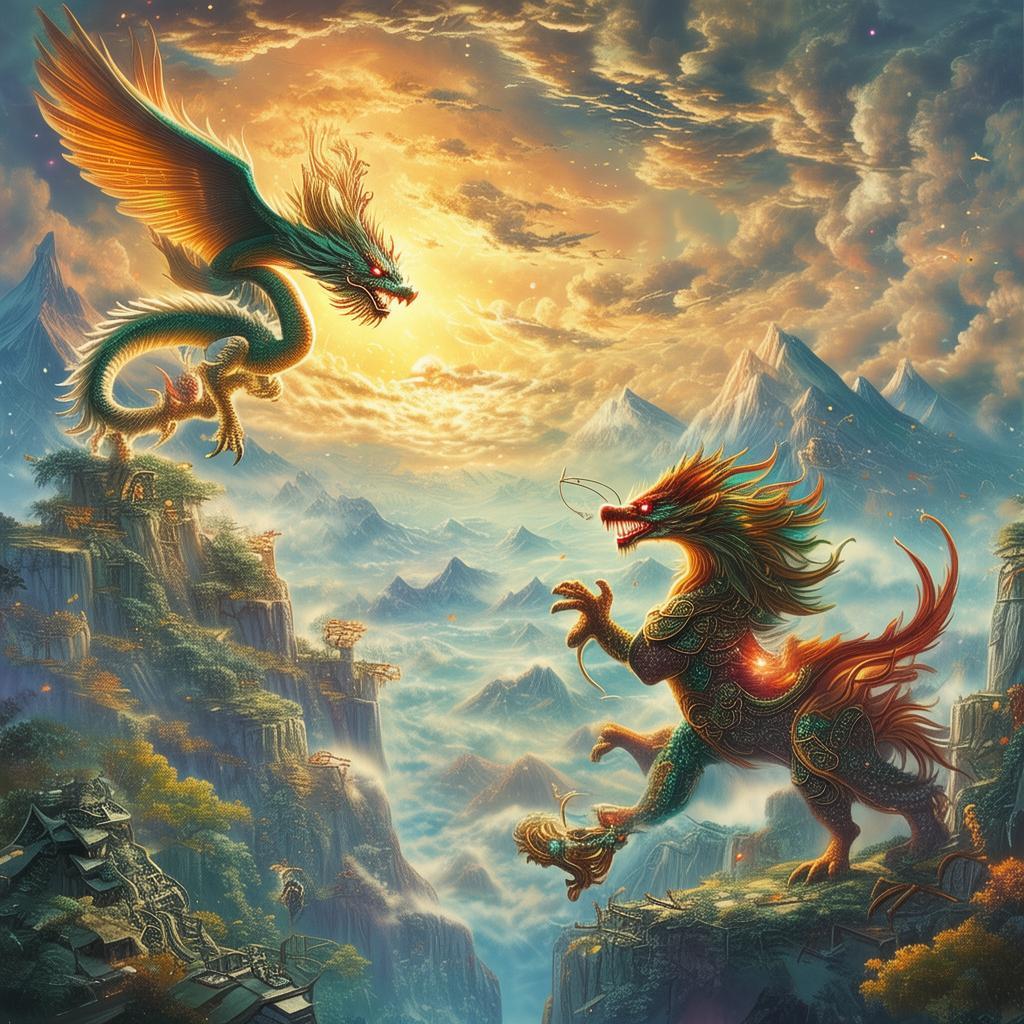The Celestial Dilemma: A Mythological Melody
In the heart of the ancient world of Elysium, where the heavens sang a melody that guided the destinies of the gods and mortals alike, lived a girl named Aria. Her voice was like a lark's song, capable of lifting spirits from the deepest despair. Aria was a celestial lyrist, a being born with the rare gift of creating music that could move the very fabric of the universe.
The Elysian sky was a canvas of iridescent hues, painted with the laughter of the gods and the tears of the fallen heroes. Aria's melodies were a part of this tapestry, a living thread that wove through the cosmos, connecting the realms of the living and the divine.
One night, as the moon hung low in the sky like a silver coin, Aria was practicing her most intricate composition in the quietude of her celestial home. She played her lyre with fervor, her fingers dancing over the strings as if guided by an unseen hand. The melody was a blend of the sweetest harmony and the most somber of laments, a reflection of her inner turmoil.

In the midst of her performance, Aria's lyre sang a note unlike any other—a discordant, haunting melody that seemed to resonate with a power far beyond her own. The room seemed to shift around her, the walls blurring as if she were caught in a maelstrom of cosmic energy.
The gods, who often watched the mortals below with amused detachment, were drawn to this disturbance in the cosmic harmony. They gathered in their celestial thrones, their eyes wide with curiosity and concern.
"Who is this mortal who dares to play such a discordant melody?" thundered Zeus, king of the gods, his voice echoing through the heavens.
The goddesses turned their eyes toward Aria, who had frozen, her lyre still in her hands, her face pale with fear. She had never played such a melody, nor had she heard it in the songs that were her constant companions.
"Master Zeus, it was not Aria who played that note," came the voice of Apollo, the god of the sun and music. "The melody was of her lyre, but the power behind it was not of this world."
The gods exchanged worried glances. The discordant melody was a sign of a great celestial dilemma, a problem so vast and complex that it could only be solved by the wisdom and courage of a mortal.
The dilemma was clear to Aria now, as she felt it in her bones and in her soul. The music that her lyre played was not her own. It was a warning, a portent of impending doom. The world was teetering on the edge of chaos, and Aria was the key to saving it.
The gods decreed that Aria must journey to the land of men, to the heart of the mortal realm, to find the answer to the celestial dilemma. With her lyre in hand and her destiny in her heart, Aria set forth on a quest that would take her through the darkest forests, the deepest seas, and the highest mountains.
She encountered beings of both light and shadow, from the wise and ancient seers to the dark and powerful sorcerers. Each one offered a piece of the puzzle, a clue that brought her closer to understanding the true nature of the dilemma.
In a hidden grove, she met an old woman who spoke in riddles. "The key to your lyre lies within the silence of the void," she whispered. In a city on the edge of a crumbling empire, she heard the whispers of the people, who spoke of a great darkness rising.
As she traveled, Aria's lyre sang more and more discordantly, its melodies growing louder and more urgent, until it seemed as though the very fabric of the universe was being torn asunder.
Finally, in a humble village hidden in the mountains, Aria found what she sought. It was a child, born with the rare gift of seeing the hidden paths of destiny. The child, with eyes that held the secrets of the cosmos, looked up at Aria and said, "You must play the melody of unity, not discord. Only through harmony can the dilemma be resolved."
With this knowledge, Aria returned to the heavens, her lyre now a vessel of harmony. She played a melody so beautiful that it filled the universe with light, dispelling the darkness that threatened to consume it.
The gods, moved by her courage and wisdom, decreed that Aria would be forever a part of their celestial chorus, her voice a guiding light for all who sought to walk the path of harmony and unity.
And so, the celestial dilemma was resolved, and the world of Elysium was saved. Aria's legend spread far and wide, her name etched into the annals of myth and song. And whenever a lyre is played in the mortal realm, the echo of Aria's melody can still be heard, a reminder of the power of harmony and the indomitable spirit of one who chose to answer the call of destiny.
✨ Original Statement ✨
All articles published on this website (including but not limited to text, images, videos, and other content) are original or authorized for reposting and are protected by relevant laws. Without the explicit written permission of this website, no individual or organization may copy, modify, repost, or use the content for commercial purposes.
If you need to quote or cooperate, please contact this site for authorization. We reserve the right to pursue legal responsibility for any unauthorized use.
Hereby declared.









